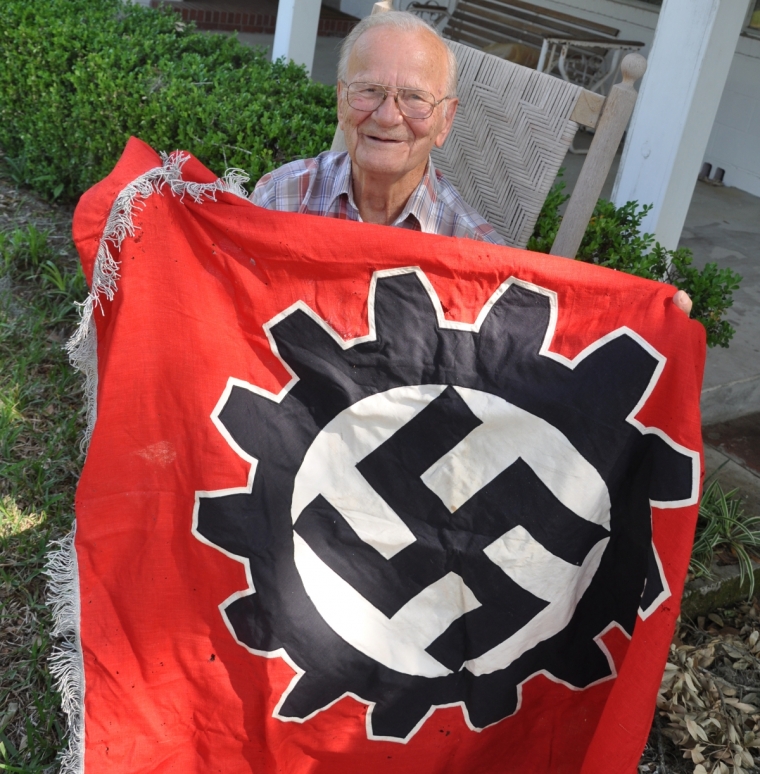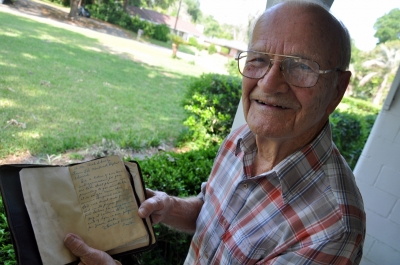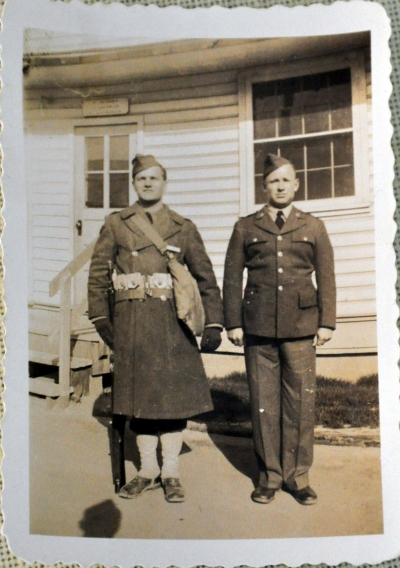WWII POW remembers 'Independence Day' at Stalag 3B

OCALA, Fla. (Christian Examiner) -- It was "Independence Day" in 1946 for the Americans interred during World War II in Stalag 3B and they couldn't wait to get to the flour mill next door to tear down the Nazi flag flying overhead.
The Nazi flag with its once loved, but now perverted swastika, flew over the flour mill adjacent to the Prisoner of War camp in Furstenberg, Germany until Arch Shealey and his brave band of brothers finally tore it from its pole and trampled it underfoot.
The hooked cross, which literally means "good fortune" -- was subverted by evildoers, encircled by a labor camp wheel on a red cloth background and has since been an extremely powerful symbol synomymous with murdering millions of people. "Burg Stargard 2" showed the mill reached its capacity for contributing to the Nazi cause.
"We went over there and tore it down and wiped our feet on it," Shealey said, recounting the day his camp was liberated.

Looking around carefully, however, Private Shealey made sure no one was watching -- and then he stuffed it into his shirt. It was the only souvenir of the war Shealy brought home to Florida, but has left hidden for years.
The flag is a sign of victory, he said. But victory few understand.
It was the victory of being liberated that day from Stalag 3B POW camp at Furstenberg, in Bravaria, Germany.
But there was another symbol of the war that started out in North Africa -- before he was one of 130,000 POW's interred in Europe and Japan -- that he holds dear.
A Bible, presented to him as a teen, by his pastor, had been his constant companion.
Left behind in a tent in North Africa when he and his unit were sent to the front at historic Kasserine Pass where they faced a barrage of enemy gunfire in one of the most critical battles in WWII -- the Bible, clearly trampled and possibly run over by a truck -- was sent home to his mother.
Shealey, now 95, remembers learning his mom received the Bible months after his capture. For the godly woman who had reared her son in church, it became a symbol of hope.
That hope sustained him as well when he thought of his mom, and his future wife, Louise, pouring over single page letters he eventually was allowed to write from the POW camps.

Twenty-seven months later, when Shealey's camp was liberated -- the final one where he was interred -- he grabbed his Nazi flag and went home to Ocala, thankful to be free at last from having spent over a third of the war imprisoned.
Seventy years later, the flag is a reminder -- not of the cruel and mocking oppression of the evil regime -- Shealey said, but of the victory and hope he felt that day when he and the others strolled freely outside the gates of the camp to capture it.
A father of four, grandfather and great-grandfather, Shealey said he spent 52 wonderful years with his wife before she died of cancer in 1997. He credits her with helping him through nightmares, later diagnosed at PTSD.
The flag and his Bible serve as a reminder of the moment he crawled flat in the dirt, with bullets flying overhead, and as a 22-year-old soldier asked God to allow a bullet only a "glancing blow" on his helmet, so he could live.
"Every day I thank Him for bringing me through my experiences as a prisoner -- that hail of bullets-and I didn't get a bullet on me," Shealey said. "I came through starvation and all of that, and I still got my health and my body. I'm thankful I know where it comes from."
-- This story is based on an original 2012 interview with Arch Shealey. Another story of Arch Shealey's experience is available in the online archived Nov. 8, 2012 edition of Florida Baptist Witness, a subscription based website which can be accessed at gofbw.com.